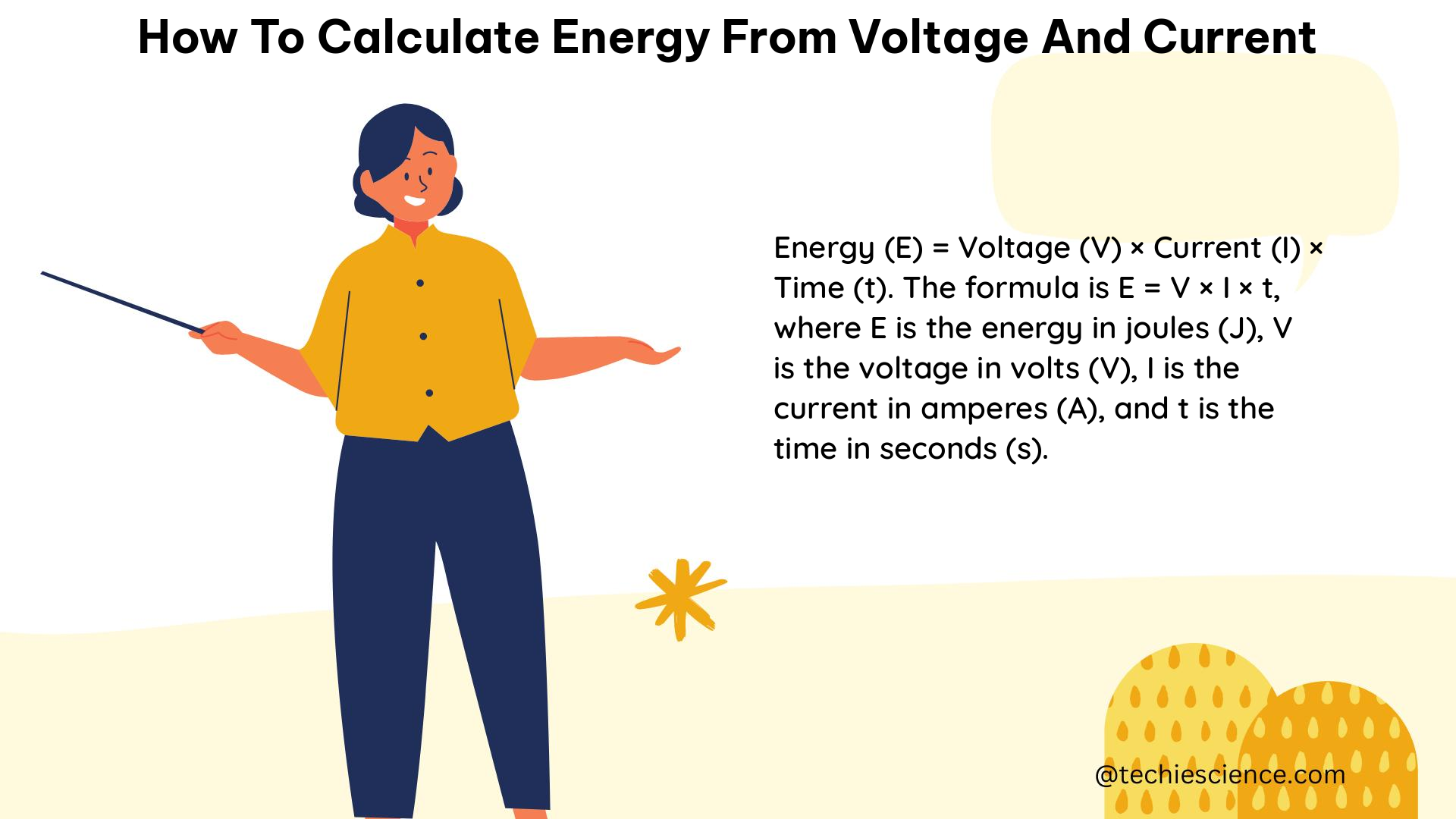When it comes to understanding electrical circuits, the ability to calculate energy from voltage and current is a fundamental skill for physics students. This comprehensive guide will provide you with a step-by-step approach to mastering this concept, complete with technical details, formulas, examples, and numerical problems to help you gain a deep understanding of the topic.
Understanding Electrical Power and Energy
The key to calculating energy from voltage and current lies in the concept of electrical power. Electrical power is the rate at which electrical energy is transferred in a circuit, and it is defined by the formula:
P = V * I
Where:
– P is the electrical power in watts (W)
– V is the voltage in volts (V)
– I is the current in amperes (A)
Once you have the power, you can calculate the energy by multiplying the power by the time for which it is applied. The formula for energy is:
E = P * t
Where:
– E is the electrical energy in watt-hours (Wh) or joules (J)
– P is the electrical power in watts (W)
– t is the time in hours (h) or seconds (s)
Calculating Energy from Voltage and Current: Examples

Let’s go through some examples to illustrate how to apply these formulas in practice.
Example 1: Calculating Power
Suppose you have a circuit with a voltage of 10 volts and a current of 2 amperes. To calculate the power, you would use the formula:
P = V * I
P = 10V * 2A
P = 20 watts
Example 2: Calculating Energy
Now, let’s say the circuit with a power of 20 watts is applied for 1 hour. To calculate the energy, you would use the formula:
E = P * t
E = 20W * 1h
E = 20 watt-hours (Wh)
Example 3: Calculating Energy for a Longer Period
If the same circuit with a power of 20 watts is applied for 5 hours, the energy calculation would be:
E = P * t
E = 20W * 5h
E = 100 watt-hours (Wh)
It’s important to note that the voltage, current, and time must be measured in consistent units for these calculations to be accurate.
Factors to Consider in Energy Calculations
When calculating energy from voltage and current, it’s essential to consider the context in which the circuit is being used. Here are some key factors to keep in mind:
-
Varying Voltage and Current: In some applications, such as solar energy systems, the voltage and current may fluctuate depending on external factors like sunlight availability. In these cases, you may need to calculate the average power over a longer period, such as a day or a month, to get a more accurate energy estimate.
-
System Efficiency: In industrial or commercial settings, the efficiency of the electrical system can impact the energy calculations. Factors like power losses, transformer efficiency, and motor efficiency should be taken into account.
-
Cost and Environmental Impact: The cost of energy and the environmental impact of the electrical system may also be relevant considerations, especially in applications where energy usage is a significant factor.
Advanced Techniques and Considerations
For more complex circuits or applications, there are additional techniques and considerations that can be used to calculate energy more accurately:
-
Waveform Analysis: In circuits with non-sinusoidal waveforms, such as those with harmonics or transients, the energy calculation may need to take into account the shape of the waveform, not just the RMS values of voltage and current.
-
Power Factor Correction: In circuits with inductive or capacitive loads, the power factor can affect the energy calculations. Techniques like power factor correction may need to be applied to ensure accurate energy estimates.
-
Energy Metering and Monitoring: Advanced energy metering and monitoring systems can provide more detailed and accurate data on energy usage, allowing for more precise energy calculations and analysis.
-
Simulation and Modeling: Computer simulations and modeling tools can be used to analyze complex circuits and systems, helping to predict and optimize energy usage.
Conclusion
Calculating energy from voltage and current is a fundamental skill for physics students, and this comprehensive guide has provided you with the necessary tools and techniques to master this concept. By understanding the underlying principles, formulas, and examples, as well as the various factors and advanced considerations, you can become proficient in accurately calculating energy in a wide range of electrical circuits and applications.
Remember, the key to success in this area is to practice, apply the concepts to different scenarios, and continuously expand your knowledge. With the resources and information provided in this guide, you are well on your way to becoming an expert in energy calculations.
References
- “Calculating Energy and Power in Electrical Circuits” by Dr. Paul A. Tipler and Gene Mosca (https://www.masteringphysics.com/encyclopedia/calculating-energy-and-power-in-electrical-circuits)
- “How to Calculate Energy and Power in Electrical Circuits” by Professor John R. Taylor (https://www.feynmanlectures.caltech.edu/II_25.html)
- “Power and Energy in Electrical Circuits” by Dr. Richard Fitzpatrick (https://farside.ph.utexas.edu/teaching/302l/lectures/node102.html)
- “Ohm’s Law Formula & Circuit Calculation Practice” by Study.com (https://study.com/academy/lesson/ohms-law-formula-circuit-calculation-practice.html)
- “Electrical Power and Energy” by University of Arizona Cooperative Extension (https://extension.arizona.edu/sites/extension.arizona.edu/files/pubs/az1782-2019.pdf)
- “What is Power Analysis?” by Dewesoft (https://dewesoft.com/blog/what-is-power-analysis)
- “Best Way to Calculate Energy Used in a Circuit” by Electronics Stack Exchange (https://electronics.stackexchange.com/questions/658173/best-way-to-calculate-energy-used-in-a-circuit)

The lambdageeks.com Core SME Team is a group of experienced subject matter experts from diverse scientific and technical fields including Physics, Chemistry, Technology,Electronics & Electrical Engineering, Automotive, Mechanical Engineering. Our team collaborates to create high-quality, well-researched articles on a wide range of science and technology topics for the lambdageeks.com website.
All Our Senior SME are having more than 7 Years of experience in the respective fields . They are either Working Industry Professionals or assocaited With different Universities. Refer Our Authors Page to get to know About our Core SMEs.